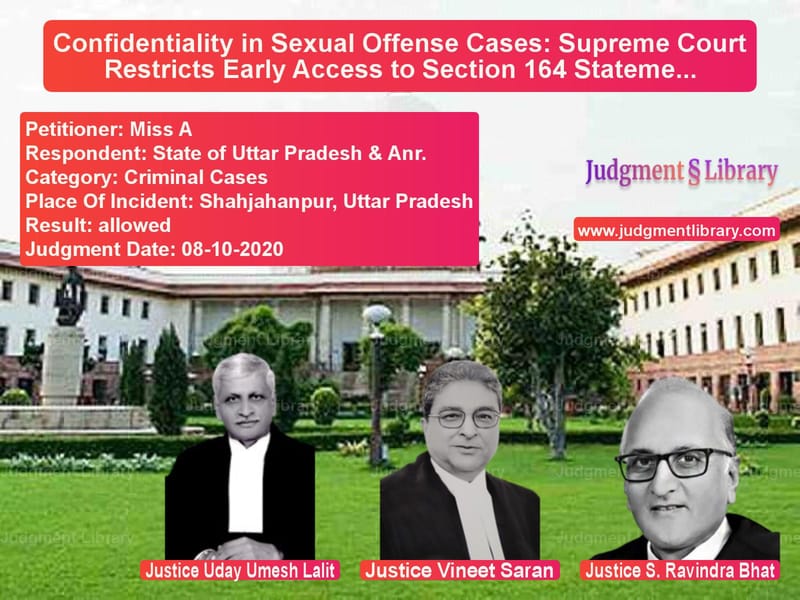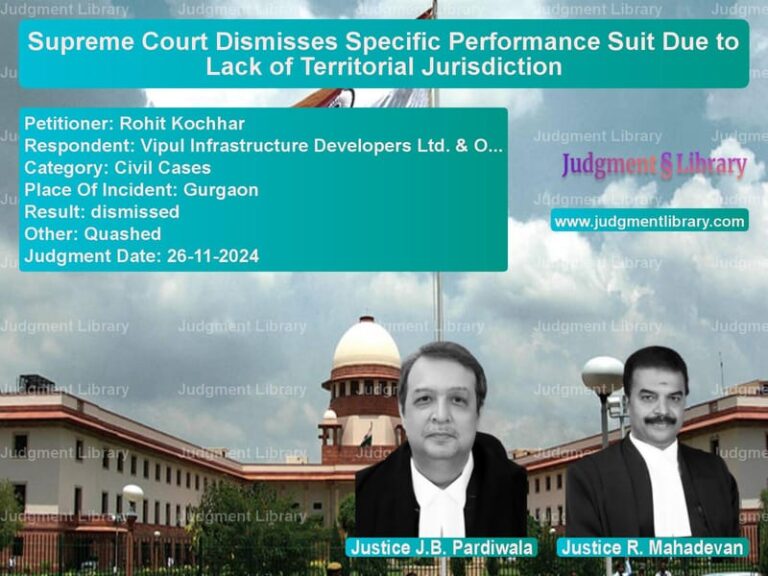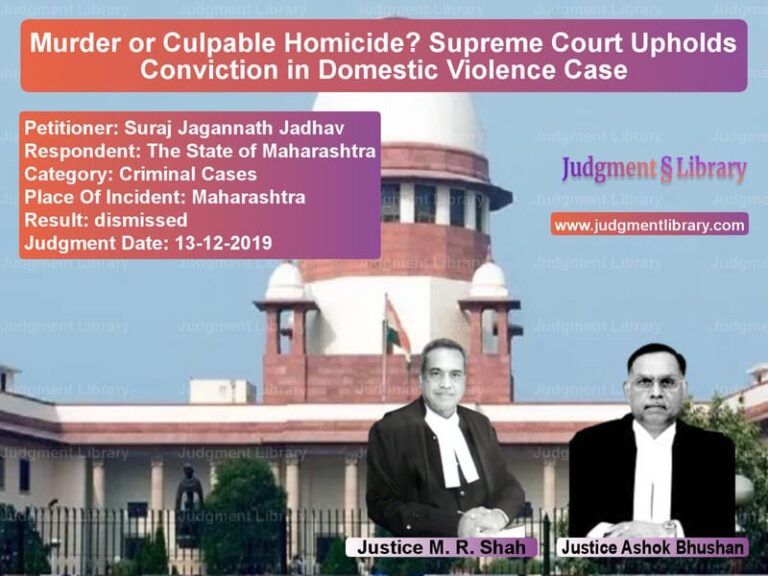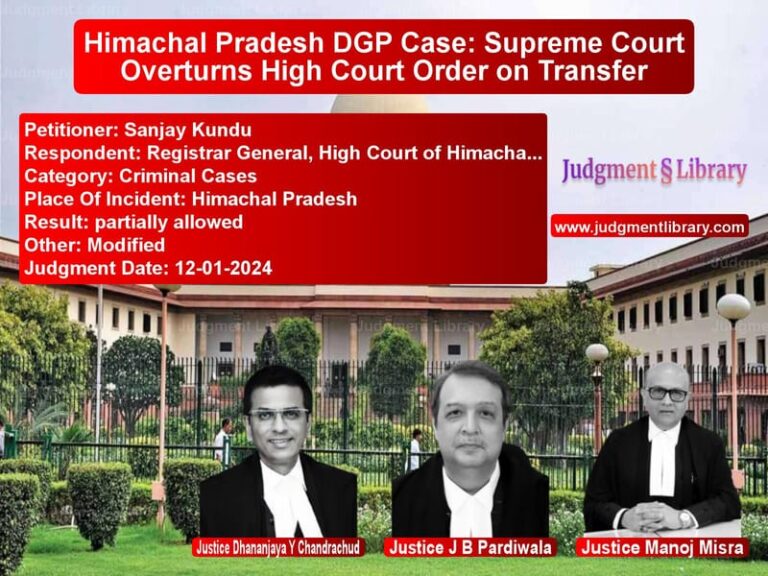Confidentiality in Sexual Offense Cases: Supreme Court Restricts Early Access to Section 164 Statements
The case of Miss A v. State of Uttar Pradesh & Anr. revolves around the issue of whether an accused is entitled to receive a copy of a victim’s statement recorded under Section 164 of the Code of Criminal Procedure (CrPC) before the court takes cognizance of the case. The Supreme Court examined whether granting such access could compromise the integrity of investigations and the safety of the victim.
Background of the Case
The case originated when Miss A’s father lodged a complaint on August 25, 2019, with the Shahjahanpur Police in Uttar Pradesh. The complaint alleged that a high-profile individual, Respondent No. 2, had sexually exploited Miss A and other women. The police initially failed to take immediate action. However, after a Facebook video of Miss A detailing the alleged abuse went viral, widespread public outcry led to a suo motu petition being registered by the Supreme Court.
While the case gained national attention, an advocate associated with the accused filed a cross-complaint alleging that Miss A had attempted to extort ₹5 crore. This led to two FIRs:
- FIR No. 442 of 2019: Against Miss A and others for alleged extortion.
- FIR No. 445 of 2019: Against Respondent No. 2 for abduction and sexual harassment.
As part of the investigation, Miss A’s statement was recorded under Section 164 CrPC on September 16, 2019. On September 19, 2019, the accused moved an application seeking a certified copy of the statement. The Additional District and Sessions Judge denied the request, citing potential risks to the victim’s safety and case integrity. However, the accused approached the Allahabad High Court, which reversed the trial court’s decision and ordered that a copy be provided. Miss A then challenged the High Court’s ruling before the Supreme Court.
Key Legal Issues
- Whether an accused is entitled to a copy of a victim’s statement recorded under Section 164 CrPC before the court takes cognizance of the offense.
- Whether premature disclosure of such statements could jeopardize the safety of the victim and key witnesses.
- Whether the principles established in State of Karnataka v. Shivanna (2014) apply to this case.
Arguments by the Petitioner
The petitioner, Miss A, argued:
- Providing the accused with a copy of her Section 164 statement at this stage would put her safety and the integrity of the case at risk.
- The Supreme Court had earlier ruled in Shivanna (2014) that such statements should not be disclosed until after the charge sheet is filed.
- The accused could use the statement to manipulate witnesses or intimidate the victim.
- The High Court misinterpreted procedural laws, disregarding the importance of victim protection in sexual offense cases.
Arguments by the Respondent
The accused, Respondent No. 2, countered:
- Under the Allahabad High Court’s 2012 ruling in Raju Janki Yadav v. State of Uttar Pradesh, an accused has the right to access statements recorded under Section 164 CrPC upon request.
- Denying access to the statement violated principles of natural justice, as the accused must know the allegations against them to prepare an effective defense.
- The case against him was politically motivated, and withholding the statement would only prolong the trial.
Supreme Court’s Observations
1. Protection of Victims in Sexual Offense Cases
The Supreme Court reaffirmed its stance in Shivanna (2014), which emphasized:
“The investigating officer shall make immediate steps to take the victim to a Judicial Magistrate for the purpose of recording her statement under Section 164 CrPC. A copy of the statement should be handed over to the investigating officer immediately with a specific direction that the contents should not be disclosed until the charge sheet is filed.”
The Court criticized the High Court for disregarding this precedent, stating that premature disclosure could compromise the safety of the victim and witnesses.
2. Procedural Fairness and Right to Defense
The Court acknowledged that an accused has the right to defend themselves but clarified:
“The right to receive a copy of the statement under Section 164 CrPC arises only after cognizance is taken and at the stage contemplated by Sections 207 and 208 CrPC.”
Thus, the accused does not automatically have the right to obtain a copy of the statement during the investigation stage.
3. Confidentiality and Victim Protection
The Court stressed that confidentiality is crucial in sexual offense cases, stating:
“Under no circumstances can copies of statements recorded under Section 164 CrPC be furnished until appropriate orders are passed after the court takes cognizance of the matter.”
The Court also overruled the 2012 Allahabad High Court decision in Raju Janki Yadav, making it subject to the principles established in Shivanna (2014).
Final Verdict
The Supreme Court allowed the appeal and set aside the High Court’s order, ruling that:
- The accused is not entitled to receive a copy of the Section 164 CrPC statement until the court takes cognizance of the case.
- Confidentiality must be maintained in sexual offense cases to protect the victim and key witnesses.
- Earlier High Court rulings allowing premature access to such statements are no longer valid.
Implications of the Judgment
This ruling reinforces several critical legal principles:
- Victim protection takes priority over procedural fairness during the investigation stage.
- Section 164 CrPC statements must remain confidential until the charge sheet is filed.
- The accused’s right to defense begins only after cognizance is taken under Sections 207 and 208 CrPC.
- Precedents allowing early access to victim statements are now overruled.
The judgment upholds victim safety, confidentiality, and procedural fairness, ensuring that sexual offense cases are investigated without undue influence or intimidation.
Petitioner Name: Miss A.Respondent Name: State of Uttar Pradesh & Anr..Judgment By: Justice Uday Umesh Lalit, Justice Vineet Saran, Justice S. Ravindra Bhat.Place Of Incident: Shahjahanpur, Uttar Pradesh.Judgment Date: 08-10-2020.
Don’t miss out on the full details! Download the complete judgment in PDF format below and gain valuable insights instantly!
Download Judgment: Miss A vs State of Uttar Prade Supreme Court of India Judgment Dated 08-10-2020.pdf
Direct Downlaod Judgment: Direct downlaod this Judgment
See all petitions in Bail and Anticipatory Bail
See all petitions in Legal Malpractice
See all petitions in Judgment by Uday Umesh Lalit
See all petitions in Judgment by Vineet Saran
See all petitions in Judgment by S Ravindra Bhat
See all petitions in allowed
See all petitions in supreme court of India judgments October 2020
See all petitions in 2020 judgments
See all posts in Criminal Cases Category
See all allowed petitions in Criminal Cases Category
See all Dismissed petitions in Criminal Cases Category
See all partially allowed petitions in Criminal Cases Category







